Business Law Assignment: Corporate Law and Business Structures
VerifiedAdded on 2023/01/23
|10
|2793
|36
Homework Assignment
AI Summary
This document provides comprehensive answers to a business law assignment, addressing key concepts in corporate law, agency, and business structures. The assignment covers the principle of corporate personality, as illustrated in Salomon v Salomon & Co Ltd, and explores different forms of business partnerships, including general and limited liability partnerships. It also delves into the relationship between principals and agents, explaining apparent authority and its requirements. Furthermore, the assignment examines the roles and responsibilities of company directors, including their duties and the implications of acting within or exceeding their powers. It also explores the duties to avoid conflicts of interest. The document concludes with an analysis of company winding up, differentiating between members' voluntary winding up and creditors' voluntary winding up, along with the role of the liquidator. Additional questions on limited partnerships and limited liability partnerships are also answered, along with the distinction between actual and apparent authority. This assignment offers a complete overview of important business law topics.
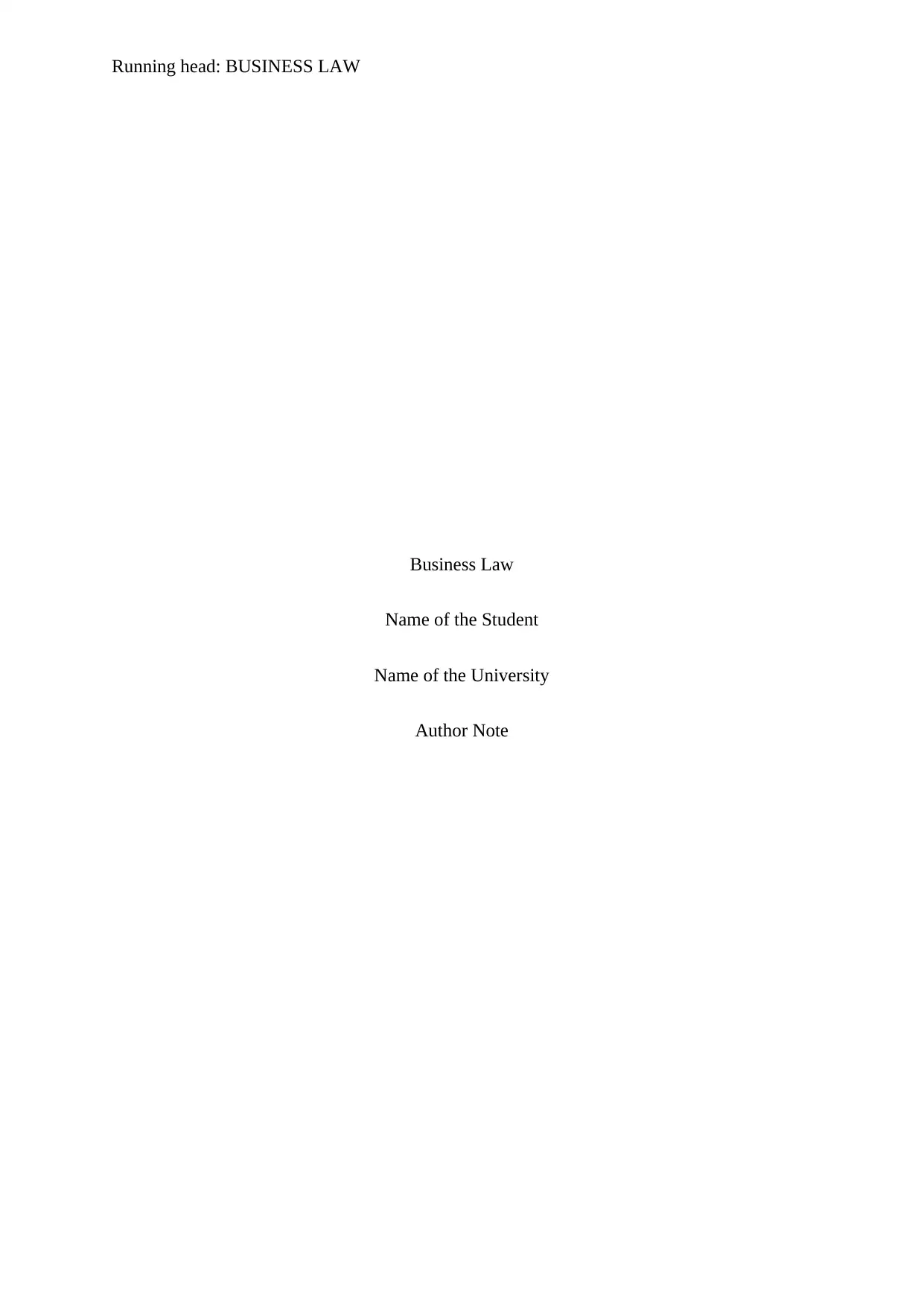
Running head: BUSINESS LAW
Business Law
Name of the Student
Name of the University
Author Note
Business Law
Name of the Student
Name of the University
Author Note
Paraphrase This Document
Need a fresh take? Get an instant paraphrase of this document with our AI Paraphraser
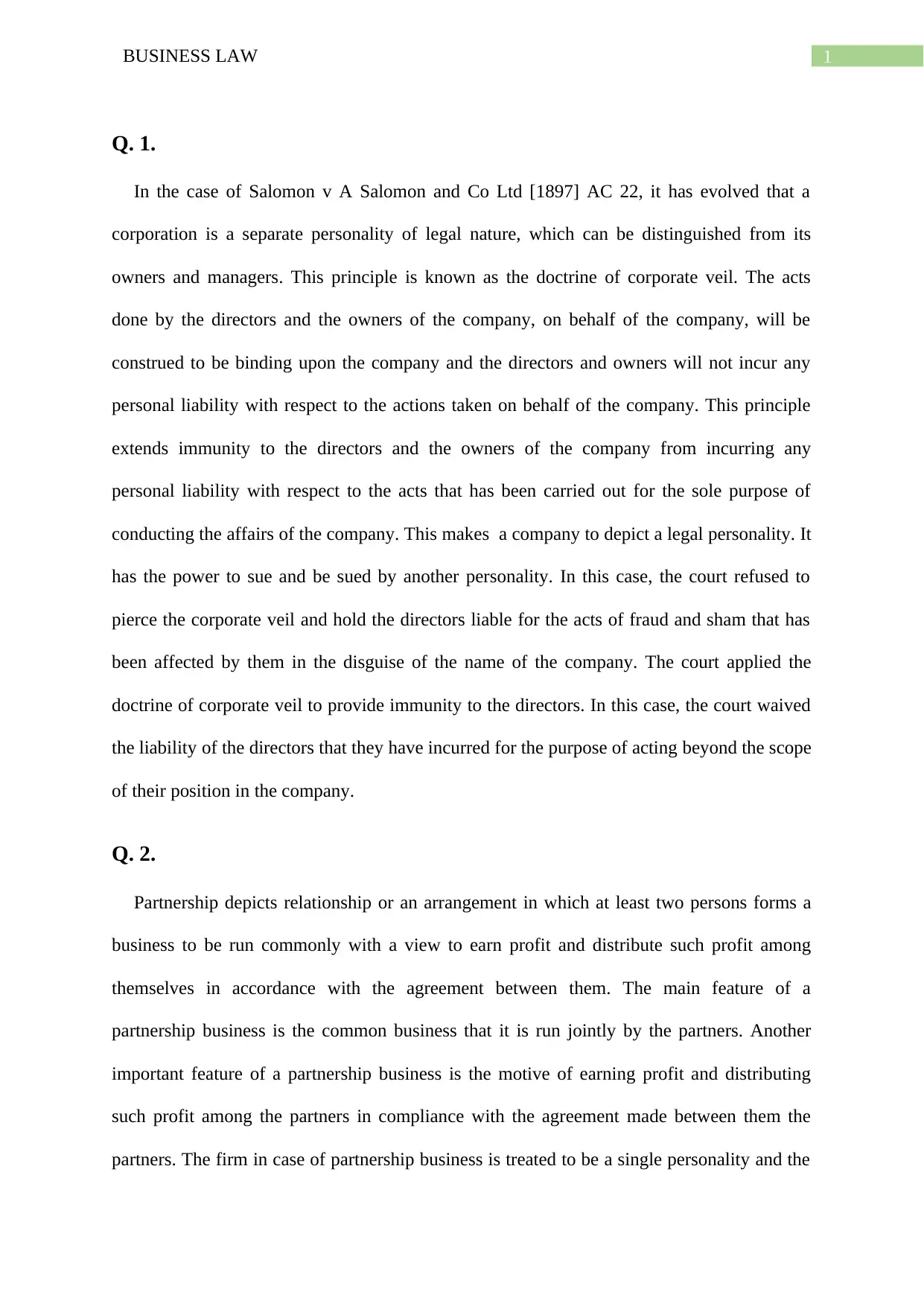
1BUSINESS LAW
Q. 1.
In the case of Salomon v A Salomon and Co Ltd [1897] AC 22, it has evolved that a
corporation is a separate personality of legal nature, which can be distinguished from its
owners and managers. This principle is known as the doctrine of corporate veil. The acts
done by the directors and the owners of the company, on behalf of the company, will be
construed to be binding upon the company and the directors and owners will not incur any
personal liability with respect to the actions taken on behalf of the company. This principle
extends immunity to the directors and the owners of the company from incurring any
personal liability with respect to the acts that has been carried out for the sole purpose of
conducting the affairs of the company. This makes a company to depict a legal personality. It
has the power to sue and be sued by another personality. In this case, the court refused to
pierce the corporate veil and hold the directors liable for the acts of fraud and sham that has
been affected by them in the disguise of the name of the company. The court applied the
doctrine of corporate veil to provide immunity to the directors. In this case, the court waived
the liability of the directors that they have incurred for the purpose of acting beyond the scope
of their position in the company.
Q. 2.
Partnership depicts relationship or an arrangement in which at least two persons forms a
business to be run commonly with a view to earn profit and distribute such profit among
themselves in accordance with the agreement between them. The main feature of a
partnership business is the common business that it is run jointly by the partners. Another
important feature of a partnership business is the motive of earning profit and distributing
such profit among the partners in compliance with the agreement made between them the
partners. The firm in case of partnership business is treated to be a single personality and the
Q. 1.
In the case of Salomon v A Salomon and Co Ltd [1897] AC 22, it has evolved that a
corporation is a separate personality of legal nature, which can be distinguished from its
owners and managers. This principle is known as the doctrine of corporate veil. The acts
done by the directors and the owners of the company, on behalf of the company, will be
construed to be binding upon the company and the directors and owners will not incur any
personal liability with respect to the actions taken on behalf of the company. This principle
extends immunity to the directors and the owners of the company from incurring any
personal liability with respect to the acts that has been carried out for the sole purpose of
conducting the affairs of the company. This makes a company to depict a legal personality. It
has the power to sue and be sued by another personality. In this case, the court refused to
pierce the corporate veil and hold the directors liable for the acts of fraud and sham that has
been affected by them in the disguise of the name of the company. The court applied the
doctrine of corporate veil to provide immunity to the directors. In this case, the court waived
the liability of the directors that they have incurred for the purpose of acting beyond the scope
of their position in the company.
Q. 2.
Partnership depicts relationship or an arrangement in which at least two persons forms a
business to be run commonly with a view to earn profit and distribute such profit among
themselves in accordance with the agreement between them. The main feature of a
partnership business is the common business that it is run jointly by the partners. Another
important feature of a partnership business is the motive of earning profit and distributing
such profit among the partners in compliance with the agreement made between them the
partners. The firm in case of partnership business is treated to be a single personality and the
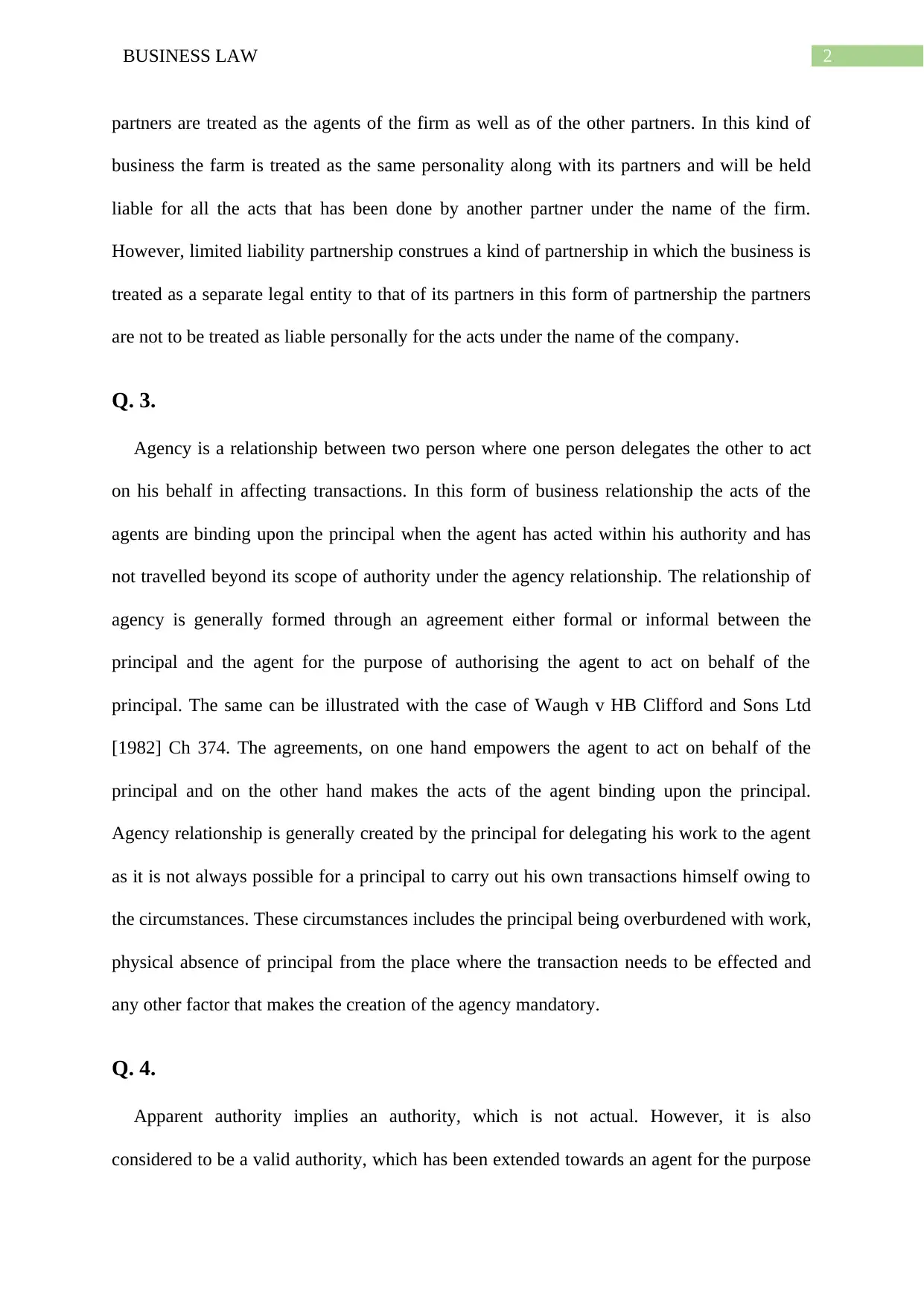
2BUSINESS LAW
partners are treated as the agents of the firm as well as of the other partners. In this kind of
business the farm is treated as the same personality along with its partners and will be held
liable for all the acts that has been done by another partner under the name of the firm.
However, limited liability partnership construes a kind of partnership in which the business is
treated as a separate legal entity to that of its partners in this form of partnership the partners
are not to be treated as liable personally for the acts under the name of the company.
Q. 3.
Agency is a relationship between two person where one person delegates the other to act
on his behalf in affecting transactions. In this form of business relationship the acts of the
agents are binding upon the principal when the agent has acted within his authority and has
not travelled beyond its scope of authority under the agency relationship. The relationship of
agency is generally formed through an agreement either formal or informal between the
principal and the agent for the purpose of authorising the agent to act on behalf of the
principal. The same can be illustrated with the case of Waugh v HB Clifford and Sons Ltd
[1982] Ch 374. The agreements, on one hand empowers the agent to act on behalf of the
principal and on the other hand makes the acts of the agent binding upon the principal.
Agency relationship is generally created by the principal for delegating his work to the agent
as it is not always possible for a principal to carry out his own transactions himself owing to
the circumstances. These circumstances includes the principal being overburdened with work,
physical absence of principal from the place where the transaction needs to be effected and
any other factor that makes the creation of the agency mandatory.
Q. 4.
Apparent authority implies an authority, which is not actual. However, it is also
considered to be a valid authority, which has been extended towards an agent for the purpose
partners are treated as the agents of the firm as well as of the other partners. In this kind of
business the farm is treated as the same personality along with its partners and will be held
liable for all the acts that has been done by another partner under the name of the firm.
However, limited liability partnership construes a kind of partnership in which the business is
treated as a separate legal entity to that of its partners in this form of partnership the partners
are not to be treated as liable personally for the acts under the name of the company.
Q. 3.
Agency is a relationship between two person where one person delegates the other to act
on his behalf in affecting transactions. In this form of business relationship the acts of the
agents are binding upon the principal when the agent has acted within his authority and has
not travelled beyond its scope of authority under the agency relationship. The relationship of
agency is generally formed through an agreement either formal or informal between the
principal and the agent for the purpose of authorising the agent to act on behalf of the
principal. The same can be illustrated with the case of Waugh v HB Clifford and Sons Ltd
[1982] Ch 374. The agreements, on one hand empowers the agent to act on behalf of the
principal and on the other hand makes the acts of the agent binding upon the principal.
Agency relationship is generally created by the principal for delegating his work to the agent
as it is not always possible for a principal to carry out his own transactions himself owing to
the circumstances. These circumstances includes the principal being overburdened with work,
physical absence of principal from the place where the transaction needs to be effected and
any other factor that makes the creation of the agency mandatory.
Q. 4.
Apparent authority implies an authority, which is not actual. However, it is also
considered to be a valid authority, which has been extended towards an agent for the purpose
⊘ This is a preview!⊘
Do you want full access?
Subscribe today to unlock all pages.

Trusted by 1+ million students worldwide
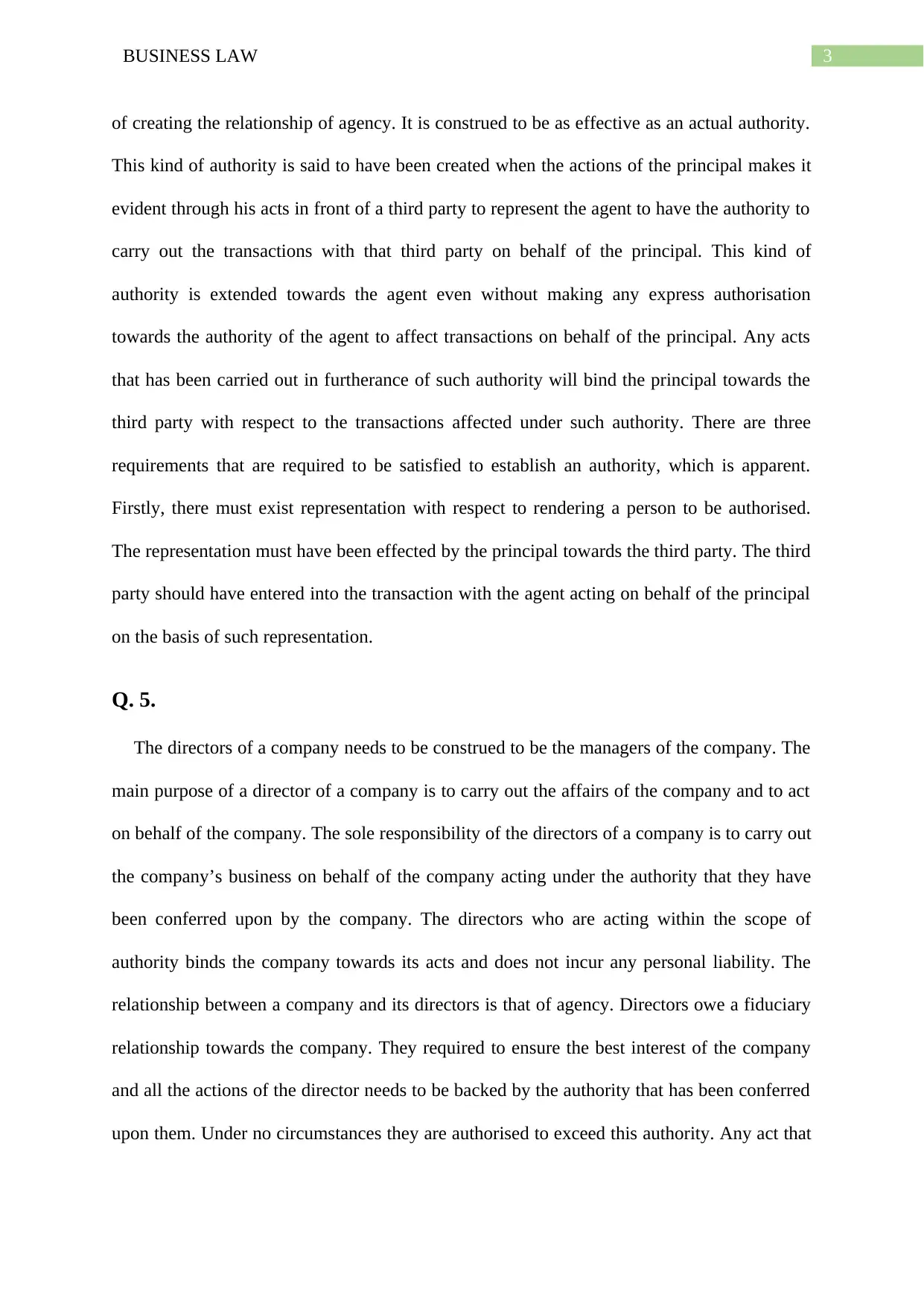
3BUSINESS LAW
of creating the relationship of agency. It is construed to be as effective as an actual authority.
This kind of authority is said to have been created when the actions of the principal makes it
evident through his acts in front of a third party to represent the agent to have the authority to
carry out the transactions with that third party on behalf of the principal. This kind of
authority is extended towards the agent even without making any express authorisation
towards the authority of the agent to affect transactions on behalf of the principal. Any acts
that has been carried out in furtherance of such authority will bind the principal towards the
third party with respect to the transactions affected under such authority. There are three
requirements that are required to be satisfied to establish an authority, which is apparent.
Firstly, there must exist representation with respect to rendering a person to be authorised.
The representation must have been effected by the principal towards the third party. The third
party should have entered into the transaction with the agent acting on behalf of the principal
on the basis of such representation.
Q. 5.
The directors of a company needs to be construed to be the managers of the company. The
main purpose of a director of a company is to carry out the affairs of the company and to act
on behalf of the company. The sole responsibility of the directors of a company is to carry out
the company’s business on behalf of the company acting under the authority that they have
been conferred upon by the company. The directors who are acting within the scope of
authority binds the company towards its acts and does not incur any personal liability. The
relationship between a company and its directors is that of agency. Directors owe a fiduciary
relationship towards the company. They required to ensure the best interest of the company
and all the actions of the director needs to be backed by the authority that has been conferred
upon them. Under no circumstances they are authorised to exceed this authority. Any act that
of creating the relationship of agency. It is construed to be as effective as an actual authority.
This kind of authority is said to have been created when the actions of the principal makes it
evident through his acts in front of a third party to represent the agent to have the authority to
carry out the transactions with that third party on behalf of the principal. This kind of
authority is extended towards the agent even without making any express authorisation
towards the authority of the agent to affect transactions on behalf of the principal. Any acts
that has been carried out in furtherance of such authority will bind the principal towards the
third party with respect to the transactions affected under such authority. There are three
requirements that are required to be satisfied to establish an authority, which is apparent.
Firstly, there must exist representation with respect to rendering a person to be authorised.
The representation must have been effected by the principal towards the third party. The third
party should have entered into the transaction with the agent acting on behalf of the principal
on the basis of such representation.
Q. 5.
The directors of a company needs to be construed to be the managers of the company. The
main purpose of a director of a company is to carry out the affairs of the company and to act
on behalf of the company. The sole responsibility of the directors of a company is to carry out
the company’s business on behalf of the company acting under the authority that they have
been conferred upon by the company. The directors who are acting within the scope of
authority binds the company towards its acts and does not incur any personal liability. The
relationship between a company and its directors is that of agency. Directors owe a fiduciary
relationship towards the company. They required to ensure the best interest of the company
and all the actions of the director needs to be backed by the authority that has been conferred
upon them. Under no circumstances they are authorised to exceed this authority. Any act that
Paraphrase This Document
Need a fresh take? Get an instant paraphrase of this document with our AI Paraphraser
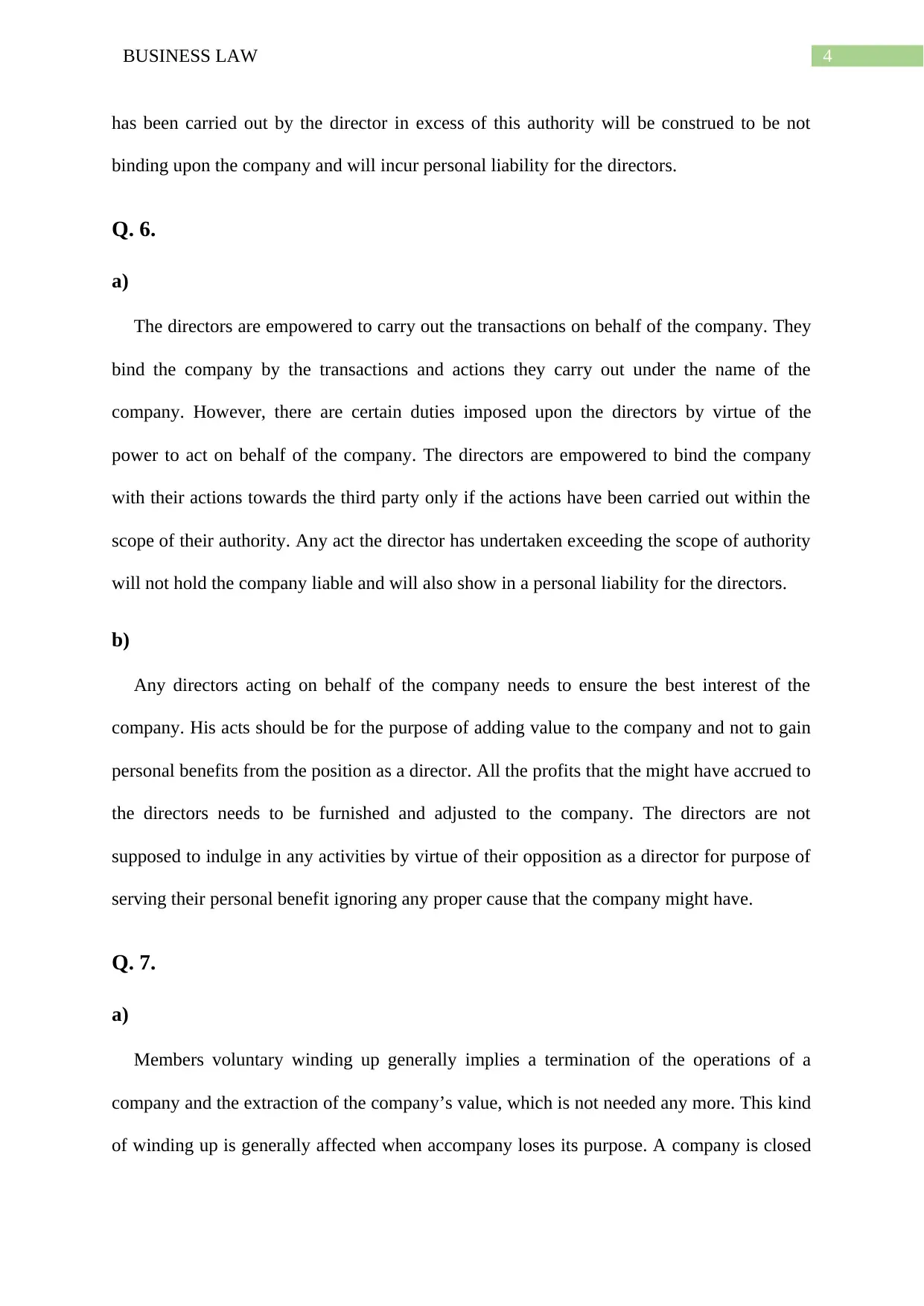
4BUSINESS LAW
has been carried out by the director in excess of this authority will be construed to be not
binding upon the company and will incur personal liability for the directors.
Q. 6.
a)
The directors are empowered to carry out the transactions on behalf of the company. They
bind the company by the transactions and actions they carry out under the name of the
company. However, there are certain duties imposed upon the directors by virtue of the
power to act on behalf of the company. The directors are empowered to bind the company
with their actions towards the third party only if the actions have been carried out within the
scope of their authority. Any act the director has undertaken exceeding the scope of authority
will not hold the company liable and will also show in a personal liability for the directors.
b)
Any directors acting on behalf of the company needs to ensure the best interest of the
company. His acts should be for the purpose of adding value to the company and not to gain
personal benefits from the position as a director. All the profits that the might have accrued to
the directors needs to be furnished and adjusted to the company. The directors are not
supposed to indulge in any activities by virtue of their opposition as a director for purpose of
serving their personal benefit ignoring any proper cause that the company might have.
Q. 7.
a)
Members voluntary winding up generally implies a termination of the operations of a
company and the extraction of the company’s value, which is not needed any more. This kind
of winding up is generally affected when accompany loses its purpose. A company is closed
has been carried out by the director in excess of this authority will be construed to be not
binding upon the company and will incur personal liability for the directors.
Q. 6.
a)
The directors are empowered to carry out the transactions on behalf of the company. They
bind the company by the transactions and actions they carry out under the name of the
company. However, there are certain duties imposed upon the directors by virtue of the
power to act on behalf of the company. The directors are empowered to bind the company
with their actions towards the third party only if the actions have been carried out within the
scope of their authority. Any act the director has undertaken exceeding the scope of authority
will not hold the company liable and will also show in a personal liability for the directors.
b)
Any directors acting on behalf of the company needs to ensure the best interest of the
company. His acts should be for the purpose of adding value to the company and not to gain
personal benefits from the position as a director. All the profits that the might have accrued to
the directors needs to be furnished and adjusted to the company. The directors are not
supposed to indulge in any activities by virtue of their opposition as a director for purpose of
serving their personal benefit ignoring any proper cause that the company might have.
Q. 7.
a)
Members voluntary winding up generally implies a termination of the operations of a
company and the extraction of the company’s value, which is not needed any more. This kind
of winding up is generally affected when accompany loses its purpose. A company is closed
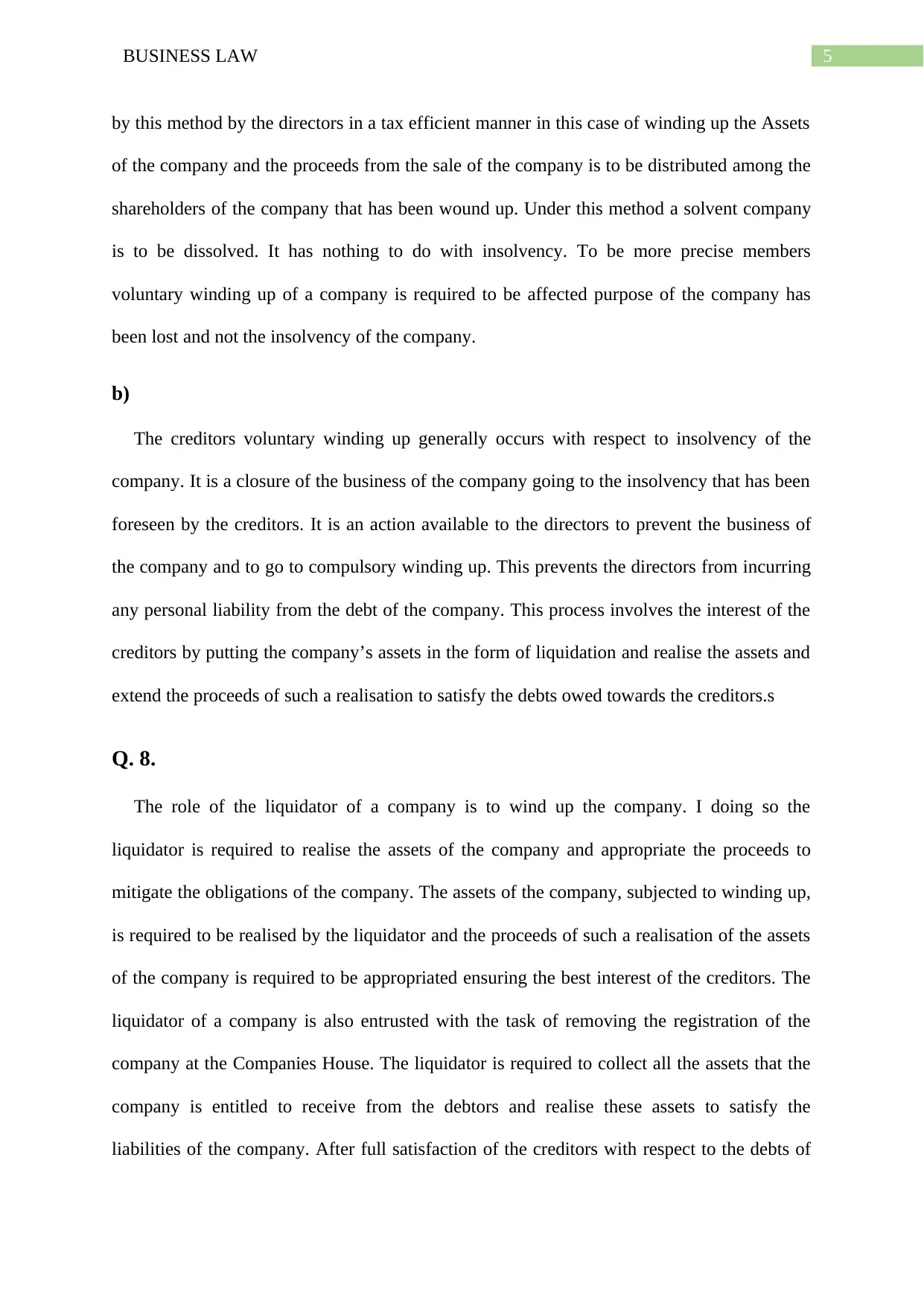
5BUSINESS LAW
by this method by the directors in a tax efficient manner in this case of winding up the Assets
of the company and the proceeds from the sale of the company is to be distributed among the
shareholders of the company that has been wound up. Under this method a solvent company
is to be dissolved. It has nothing to do with insolvency. To be more precise members
voluntary winding up of a company is required to be affected purpose of the company has
been lost and not the insolvency of the company.
b)
The creditors voluntary winding up generally occurs with respect to insolvency of the
company. It is a closure of the business of the company going to the insolvency that has been
foreseen by the creditors. It is an action available to the directors to prevent the business of
the company and to go to compulsory winding up. This prevents the directors from incurring
any personal liability from the debt of the company. This process involves the interest of the
creditors by putting the company’s assets in the form of liquidation and realise the assets and
extend the proceeds of such a realisation to satisfy the debts owed towards the creditors.s
Q. 8.
The role of the liquidator of a company is to wind up the company. I doing so the
liquidator is required to realise the assets of the company and appropriate the proceeds to
mitigate the obligations of the company. The assets of the company, subjected to winding up,
is required to be realised by the liquidator and the proceeds of such a realisation of the assets
of the company is required to be appropriated ensuring the best interest of the creditors. The
liquidator of a company is also entrusted with the task of removing the registration of the
company at the Companies House. The liquidator is required to collect all the assets that the
company is entitled to receive from the debtors and realise these assets to satisfy the
liabilities of the company. After full satisfaction of the creditors with respect to the debts of
by this method by the directors in a tax efficient manner in this case of winding up the Assets
of the company and the proceeds from the sale of the company is to be distributed among the
shareholders of the company that has been wound up. Under this method a solvent company
is to be dissolved. It has nothing to do with insolvency. To be more precise members
voluntary winding up of a company is required to be affected purpose of the company has
been lost and not the insolvency of the company.
b)
The creditors voluntary winding up generally occurs with respect to insolvency of the
company. It is a closure of the business of the company going to the insolvency that has been
foreseen by the creditors. It is an action available to the directors to prevent the business of
the company and to go to compulsory winding up. This prevents the directors from incurring
any personal liability from the debt of the company. This process involves the interest of the
creditors by putting the company’s assets in the form of liquidation and realise the assets and
extend the proceeds of such a realisation to satisfy the debts owed towards the creditors.s
Q. 8.
The role of the liquidator of a company is to wind up the company. I doing so the
liquidator is required to realise the assets of the company and appropriate the proceeds to
mitigate the obligations of the company. The assets of the company, subjected to winding up,
is required to be realised by the liquidator and the proceeds of such a realisation of the assets
of the company is required to be appropriated ensuring the best interest of the creditors. The
liquidator of a company is also entrusted with the task of removing the registration of the
company at the Companies House. The liquidator is required to collect all the assets that the
company is entitled to receive from the debtors and realise these assets to satisfy the
liabilities of the company. After full satisfaction of the creditors with respect to the debts of
⊘ This is a preview!⊘
Do you want full access?
Subscribe today to unlock all pages.

Trusted by 1+ million students worldwide
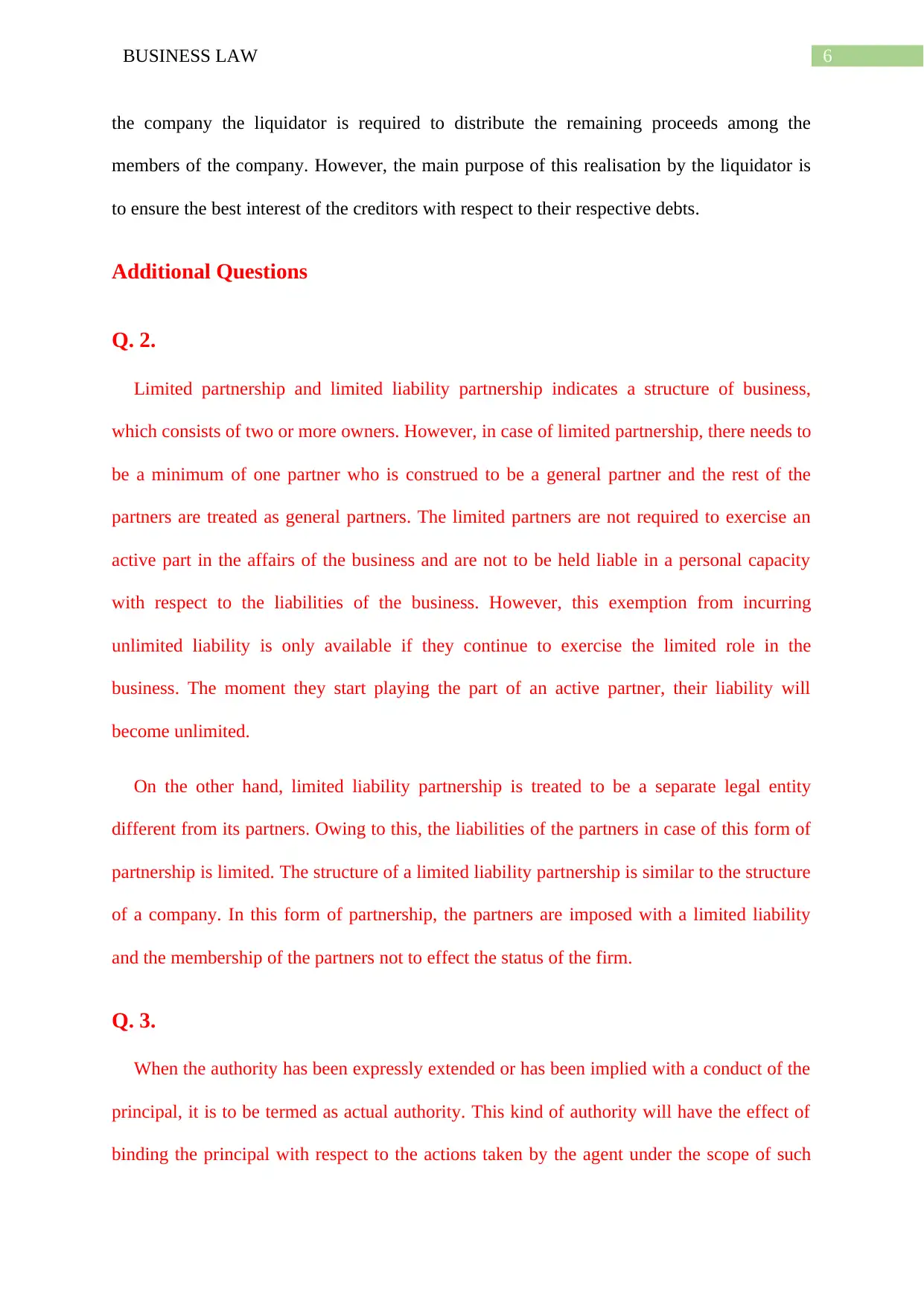
6BUSINESS LAW
the company the liquidator is required to distribute the remaining proceeds among the
members of the company. However, the main purpose of this realisation by the liquidator is
to ensure the best interest of the creditors with respect to their respective debts.
Additional Questions
Q. 2.
Limited partnership and limited liability partnership indicates a structure of business,
which consists of two or more owners. However, in case of limited partnership, there needs to
be a minimum of one partner who is construed to be a general partner and the rest of the
partners are treated as general partners. The limited partners are not required to exercise an
active part in the affairs of the business and are not to be held liable in a personal capacity
with respect to the liabilities of the business. However, this exemption from incurring
unlimited liability is only available if they continue to exercise the limited role in the
business. The moment they start playing the part of an active partner, their liability will
become unlimited.
On the other hand, limited liability partnership is treated to be a separate legal entity
different from its partners. Owing to this, the liabilities of the partners in case of this form of
partnership is limited. The structure of a limited liability partnership is similar to the structure
of a company. In this form of partnership, the partners are imposed with a limited liability
and the membership of the partners not to effect the status of the firm.
Q. 3.
When the authority has been expressly extended or has been implied with a conduct of the
principal, it is to be termed as actual authority. This kind of authority will have the effect of
binding the principal with respect to the actions taken by the agent under the scope of such
the company the liquidator is required to distribute the remaining proceeds among the
members of the company. However, the main purpose of this realisation by the liquidator is
to ensure the best interest of the creditors with respect to their respective debts.
Additional Questions
Q. 2.
Limited partnership and limited liability partnership indicates a structure of business,
which consists of two or more owners. However, in case of limited partnership, there needs to
be a minimum of one partner who is construed to be a general partner and the rest of the
partners are treated as general partners. The limited partners are not required to exercise an
active part in the affairs of the business and are not to be held liable in a personal capacity
with respect to the liabilities of the business. However, this exemption from incurring
unlimited liability is only available if they continue to exercise the limited role in the
business. The moment they start playing the part of an active partner, their liability will
become unlimited.
On the other hand, limited liability partnership is treated to be a separate legal entity
different from its partners. Owing to this, the liabilities of the partners in case of this form of
partnership is limited. The structure of a limited liability partnership is similar to the structure
of a company. In this form of partnership, the partners are imposed with a limited liability
and the membership of the partners not to effect the status of the firm.
Q. 3.
When the authority has been expressly extended or has been implied with a conduct of the
principal, it is to be termed as actual authority. This kind of authority will have the effect of
binding the principal with respect to the actions taken by the agent under the scope of such
Paraphrase This Document
Need a fresh take? Get an instant paraphrase of this document with our AI Paraphraser
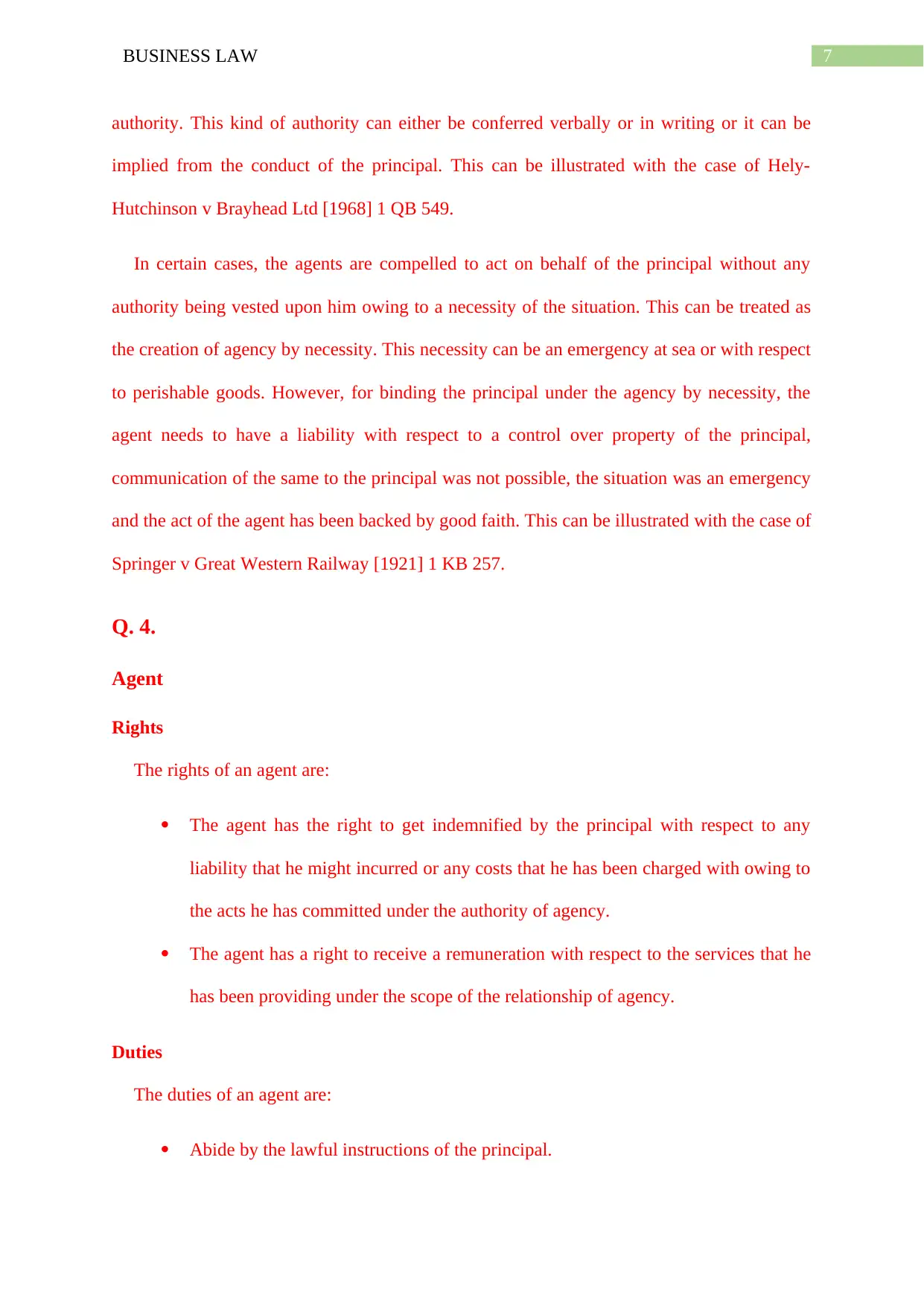
7BUSINESS LAW
authority. This kind of authority can either be conferred verbally or in writing or it can be
implied from the conduct of the principal. This can be illustrated with the case of Hely-
Hutchinson v Brayhead Ltd [1968] 1 QB 549.
In certain cases, the agents are compelled to act on behalf of the principal without any
authority being vested upon him owing to a necessity of the situation. This can be treated as
the creation of agency by necessity. This necessity can be an emergency at sea or with respect
to perishable goods. However, for binding the principal under the agency by necessity, the
agent needs to have a liability with respect to a control over property of the principal,
communication of the same to the principal was not possible, the situation was an emergency
and the act of the agent has been backed by good faith. This can be illustrated with the case of
Springer v Great Western Railway [1921] 1 KB 257.
Q. 4.
Agent
Rights
The rights of an agent are:
The agent has the right to get indemnified by the principal with respect to any
liability that he might incurred or any costs that he has been charged with owing to
the acts he has committed under the authority of agency.
The agent has a right to receive a remuneration with respect to the services that he
has been providing under the scope of the relationship of agency.
Duties
The duties of an agent are:
Abide by the lawful instructions of the principal.
authority. This kind of authority can either be conferred verbally or in writing or it can be
implied from the conduct of the principal. This can be illustrated with the case of Hely-
Hutchinson v Brayhead Ltd [1968] 1 QB 549.
In certain cases, the agents are compelled to act on behalf of the principal without any
authority being vested upon him owing to a necessity of the situation. This can be treated as
the creation of agency by necessity. This necessity can be an emergency at sea or with respect
to perishable goods. However, for binding the principal under the agency by necessity, the
agent needs to have a liability with respect to a control over property of the principal,
communication of the same to the principal was not possible, the situation was an emergency
and the act of the agent has been backed by good faith. This can be illustrated with the case of
Springer v Great Western Railway [1921] 1 KB 257.
Q. 4.
Agent
Rights
The rights of an agent are:
The agent has the right to get indemnified by the principal with respect to any
liability that he might incurred or any costs that he has been charged with owing to
the acts he has committed under the authority of agency.
The agent has a right to receive a remuneration with respect to the services that he
has been providing under the scope of the relationship of agency.
Duties
The duties of an agent are:
Abide by the lawful instructions of the principal.
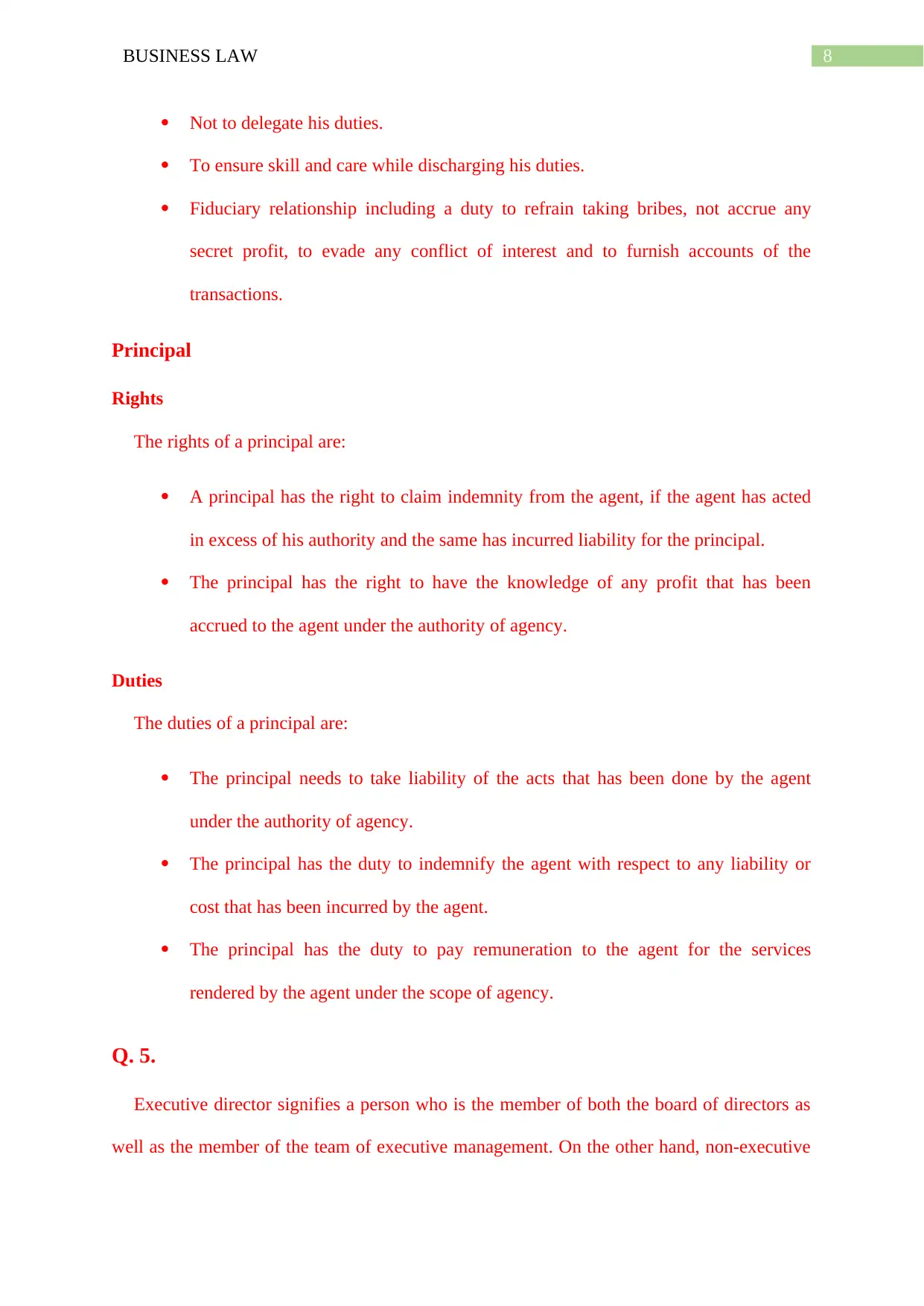
8BUSINESS LAW
Not to delegate his duties.
To ensure skill and care while discharging his duties.
Fiduciary relationship including a duty to refrain taking bribes, not accrue any
secret profit, to evade any conflict of interest and to furnish accounts of the
transactions.
Principal
Rights
The rights of a principal are:
A principal has the right to claim indemnity from the agent, if the agent has acted
in excess of his authority and the same has incurred liability for the principal.
The principal has the right to have the knowledge of any profit that has been
accrued to the agent under the authority of agency.
Duties
The duties of a principal are:
The principal needs to take liability of the acts that has been done by the agent
under the authority of agency.
The principal has the duty to indemnify the agent with respect to any liability or
cost that has been incurred by the agent.
The principal has the duty to pay remuneration to the agent for the services
rendered by the agent under the scope of agency.
Q. 5.
Executive director signifies a person who is the member of both the board of directors as
well as the member of the team of executive management. On the other hand, non-executive
Not to delegate his duties.
To ensure skill and care while discharging his duties.
Fiduciary relationship including a duty to refrain taking bribes, not accrue any
secret profit, to evade any conflict of interest and to furnish accounts of the
transactions.
Principal
Rights
The rights of a principal are:
A principal has the right to claim indemnity from the agent, if the agent has acted
in excess of his authority and the same has incurred liability for the principal.
The principal has the right to have the knowledge of any profit that has been
accrued to the agent under the authority of agency.
Duties
The duties of a principal are:
The principal needs to take liability of the acts that has been done by the agent
under the authority of agency.
The principal has the duty to indemnify the agent with respect to any liability or
cost that has been incurred by the agent.
The principal has the duty to pay remuneration to the agent for the services
rendered by the agent under the scope of agency.
Q. 5.
Executive director signifies a person who is the member of both the board of directors as
well as the member of the team of executive management. On the other hand, non-executive
⊘ This is a preview!⊘
Do you want full access?
Subscribe today to unlock all pages.

Trusted by 1+ million students worldwide
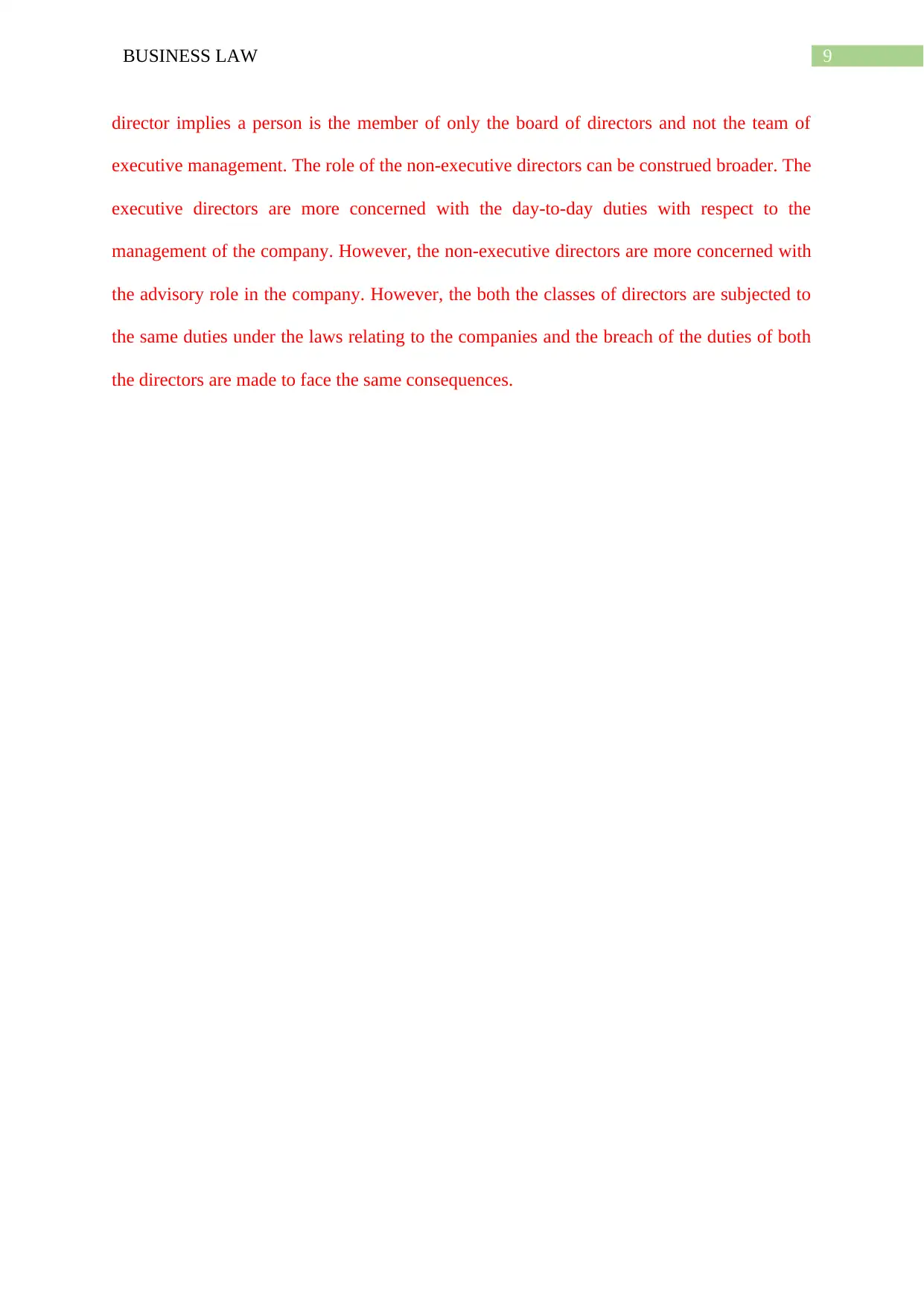
9BUSINESS LAW
director implies a person is the member of only the board of directors and not the team of
executive management. The role of the non-executive directors can be construed broader. The
executive directors are more concerned with the day-to-day duties with respect to the
management of the company. However, the non-executive directors are more concerned with
the advisory role in the company. However, the both the classes of directors are subjected to
the same duties under the laws relating to the companies and the breach of the duties of both
the directors are made to face the same consequences.
director implies a person is the member of only the board of directors and not the team of
executive management. The role of the non-executive directors can be construed broader. The
executive directors are more concerned with the day-to-day duties with respect to the
management of the company. However, the non-executive directors are more concerned with
the advisory role in the company. However, the both the classes of directors are subjected to
the same duties under the laws relating to the companies and the breach of the duties of both
the directors are made to face the same consequences.
1 out of 10
Related Documents
Your All-in-One AI-Powered Toolkit for Academic Success.
+13062052269
info@desklib.com
Available 24*7 on WhatsApp / Email
![[object Object]](/_next/static/media/star-bottom.7253800d.svg)
Unlock your academic potential
Copyright © 2020–2026 A2Z Services. All Rights Reserved. Developed and managed by ZUCOL.




